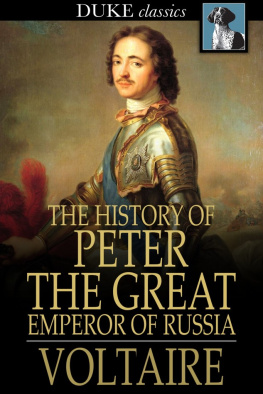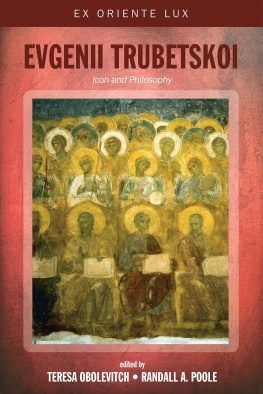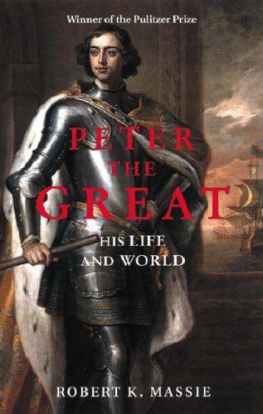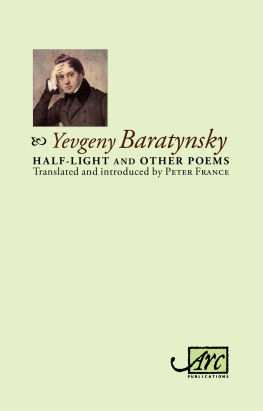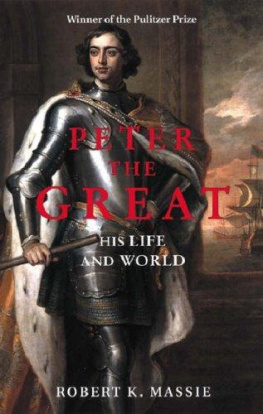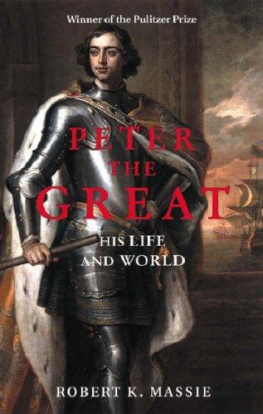THE REFORMS OF
PETER THE GREAT
The New Russian History
Series Editor: Donald J. Raleigh,
University of North Carolina, Chapel Hill
This new series makes examples of the finest work of the most eminent historians in Russia today available to English-language readers. Each volume has been specially prepared by the author with an international audience in mind, and each will be translated and introduced by an outstanding Western scholar in the same field. The next title in the series will be a sweeping study of nineteenth-century Russia by Nikolai A. Troitskii, the great historian of Russian populism, in a translation by American historian Deborah Hardy.
THE REFORMS OF
PETER THE GREAT
PROGRESS THROUGH
COERCION IN RUSSIA
Evgenii V. Anisimov
Translated with an introduction by John T. Alexander
First published 1993 by M.E. Sharpe
Published 2015 by Routledge
2 Park Square, Milton Park, Abingdon, Oxon OX14 4RN
711 Third Avenue, New York, NY 10017, USA
Routledge is an imprint of the Taylor & Francis Group, an informa business
Copyright 1993 Taylor & Francis. All rights reserved.
No part of this book may be reprinted or reproduced or utilised in any form or by any electronic, mechanical, or other means, now known or hereafter invented, including photocopying and recording, or in any information storage or retrieval system, without permission in writing from the publishers.
Notices
No responsibility is assumed by the publisher for any injury and/or damage to persons or property as a matter of products liability, negligence or otherwise, or from any use of operation of any methods, products, instructions or ideas contained in the material herein.
Practitioners and researchers must always rely on their own experience and knowledge in evaluating and using any information, methods, compounds, or experiments described herein. In using such information or methods they should be mindful of their own safety and the safety of others, including parties for whom they have a professional responsibility.
Product or corporate names may be trademarks or registered trademarks, and are used only for identification and explanation without intent to infringe.
Library of Congress Cataloging-in-Publication Data
Anisimov, E. V. (Evgenii Viktorovich)
[Vremia petrovskikh reform. English]
The reforms of Peter the Great : progress through coercion in Russia / Evgenii Anisimov; translated by John T. Alexander.
p. cm.
Condensed version of Vremia petrovskikh reform
CIP galley, p. 4.
ISBN 1-56324-047-5 (cloth)
ISBN 1-56324-048-3 (paperback)
1. RussiaHistoryPeter I, 16891725.
I. Title.
DK133.A5513 1993
947.05092dc20
92-22280
CIP
ISBN 13: 9781563240485 (pbk)
ISBN 13: 9781563240478 (hbk)
It is my pleasure to imite readers to enjoy the first volume in a series of historical works in translation, The New Russian History, whose purpose is to make available to English readers the finest work of the most eminent historians of Russia today. Addressing a broad readership, our authors hope their works will appeal to both students and general readers as well as to those with a specialized knowledge of Russia.
It is fitting that the inaugural volume in the series presents a fresh view of that giant of Russian history, Peter the Great, whose daunting image has played a central role in the evolution of Russian historical writing and in how Russians have understood their countrys place in the world. As Marc Raeff observed years ago, the historiography of Peter the Great provides an almost perfect mirror for the Russian intelligentsias views on the past and future of Russia, their relationship to the West, and the nature of the social and political problems confronting their country.1 Raeff s remark remains valid nowadays, as historians search for ways to explain how Russias political culture and historical traditions contributed to the rise of Bolshevism and shaped Marxisms peculiar development in Russia.
In fact, the shadow Peter cast over the centuries fell on a young boy growing up in Moscow province, who found in Peter his childhood hero as well as an object of his later scholarly investigations. Evgenii Viktorovich Anisimov, author of The Reforms of Peter the Great: Progress Through Coercion in Russia, moved to Leningrad to study with R.G. Skrynnikov, one of the Soviet Unions most prolific students of Muscovite Russia, and certainly one of its historical professions most notable stylists. Drawn to the banks of the Neva by his childhood hero, Anisimov made Peters city his home, where he has had a successful and productive career and enjoyed considerable international attention and acclaim.
A great historical figure with one foot in the Russian past, the other stepping brashly westward toward an abstract sense of the common good, Anisimovs Peter the Great is every bit a product of his century. Peter built more than Russias first navy: he crafted a ship of state that loaded horrendous burdens on his subjects. Its features, Anisimov intimates with irony and insight, are all too familiar to hapless Soviet citizens, precisely because many realia of the Petrine era became fixed in the publics consciousness. Peters reign marked the apotheosis of statism and his forcible experiment at creating a social utopiaor at least a rational statetransformed Russia into a regulated police state that extolled a cult of militarism and of military force. Moreover, Anisimov shows how Peters reforms bred apathy, social dependence, and lack of freedom, arguing there was something conservative in his revolutionary program, which was aimed, after all, at making Russia a great power while preserving its traditional regime.
To be sure, any drawing of analogies and links between Soviet realities and the tsarist past risks charges of ahistoricism. Anisimovs notion of Peter as the founder of a totalitarian system in Russia, however, compels the reader to take stock of the similarities between Peters approach to statecraft and that of his Soviet counterparts. In 1924 the poet Maximilian Voloshin branded Peter Russias first Bolshevik. Historical objectivity, to be sure, is not the same as literary flair, but Voloshins judgment reflected a sentiment widespread at the time. Indeed, in his magisterial biography of Stalin, Robert C. Tucker reminds us that Peter was a cult figure in some historical literature that Stalin perused in the 1920s.2 At the very least, reading Anisimovs reevaluation of Peter the Great, now available in John T. Alexanders lively translation, will improve our understanding not only of the birth of Imperial Russia, but also of contemporary Russian society. At the very least, we will come to appreciate Anisimovs contention that Russias future is more tightly bound up with its past than may appear at first glance.
Series Editor
Notes
1. Marc Raeff, ed., Peler the Great Changes Russia, 2d ed. (Lexington. Mass.: Heath, 1972), p. 195.
2. Robert C. Tucker, Stalin in Power: The Revolution from Above, 19281941 (New York: Norton, 1990), p. 61. See also pp. 6264.
The recent historical works of Evgenii Viktorovich Anisimov may be seen as important products and multifaceted reflections of the ferment in process in what used to be known as the USSR. Born in 1947, Anisimov received his higher education in Leningradnow Saint Petersburgwhere he is currently senior researcher at the St. Petersburg Branch of the Institute of history of the Russian Academy of Sciences. He has been strongly influenced by the examples of Ruslan Skrynnikov and Nikolai Pavlenko in writing history addressed to a broad readership. Prior to the publication in 1986 of his scholarly popular book,




